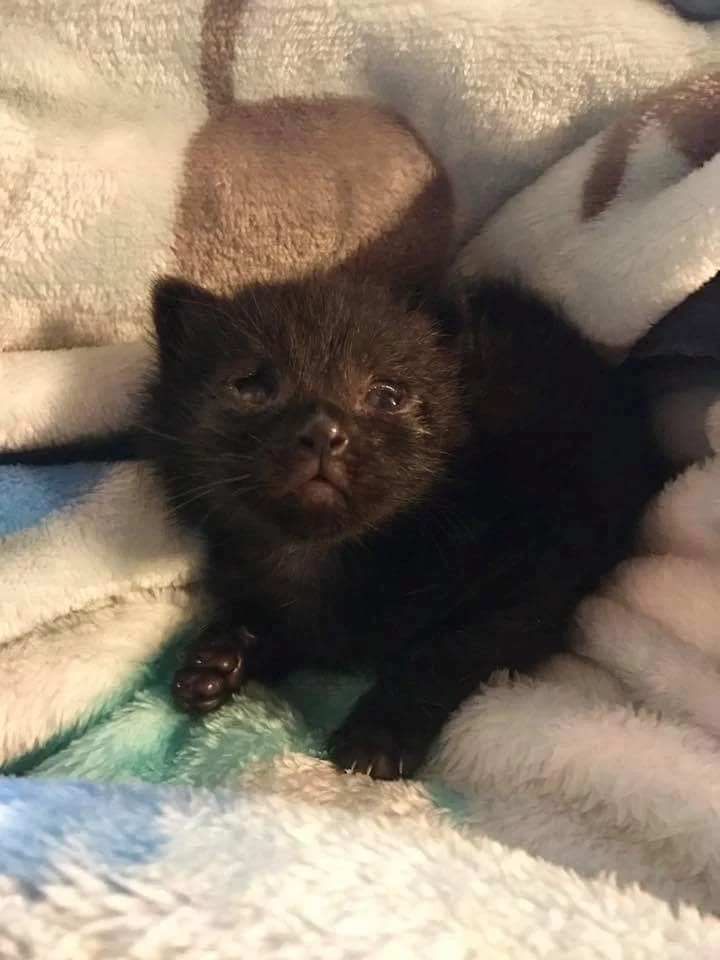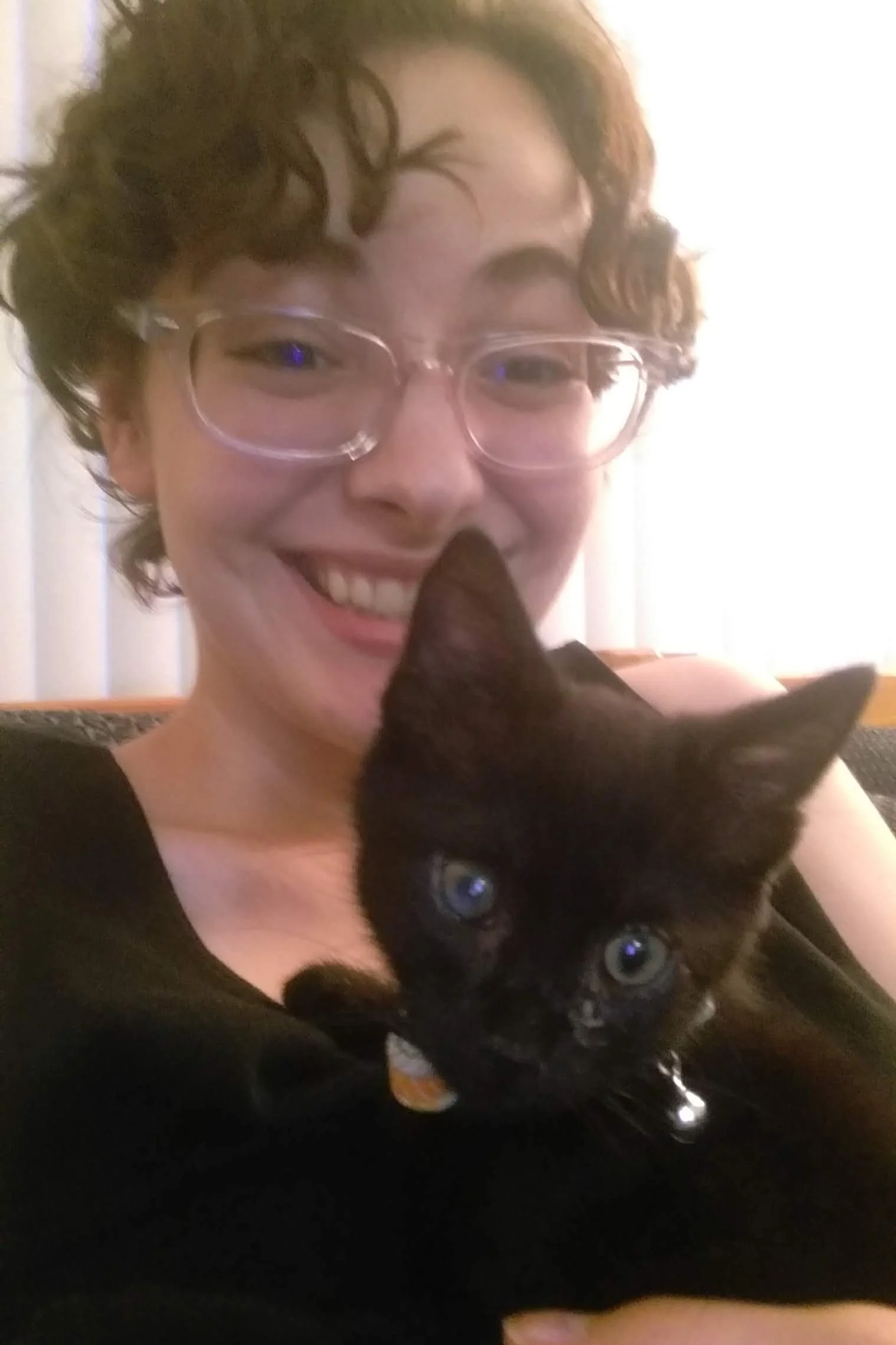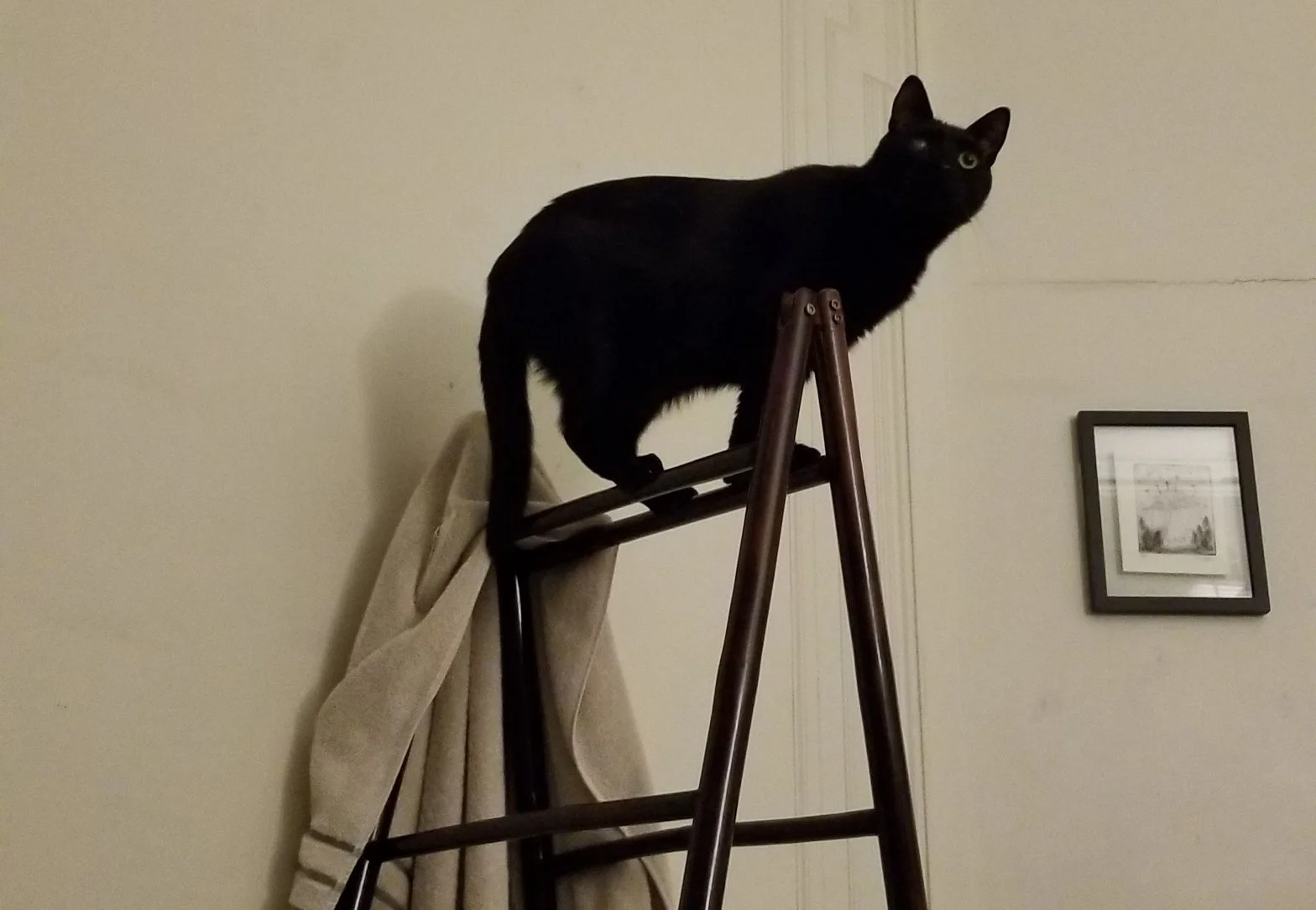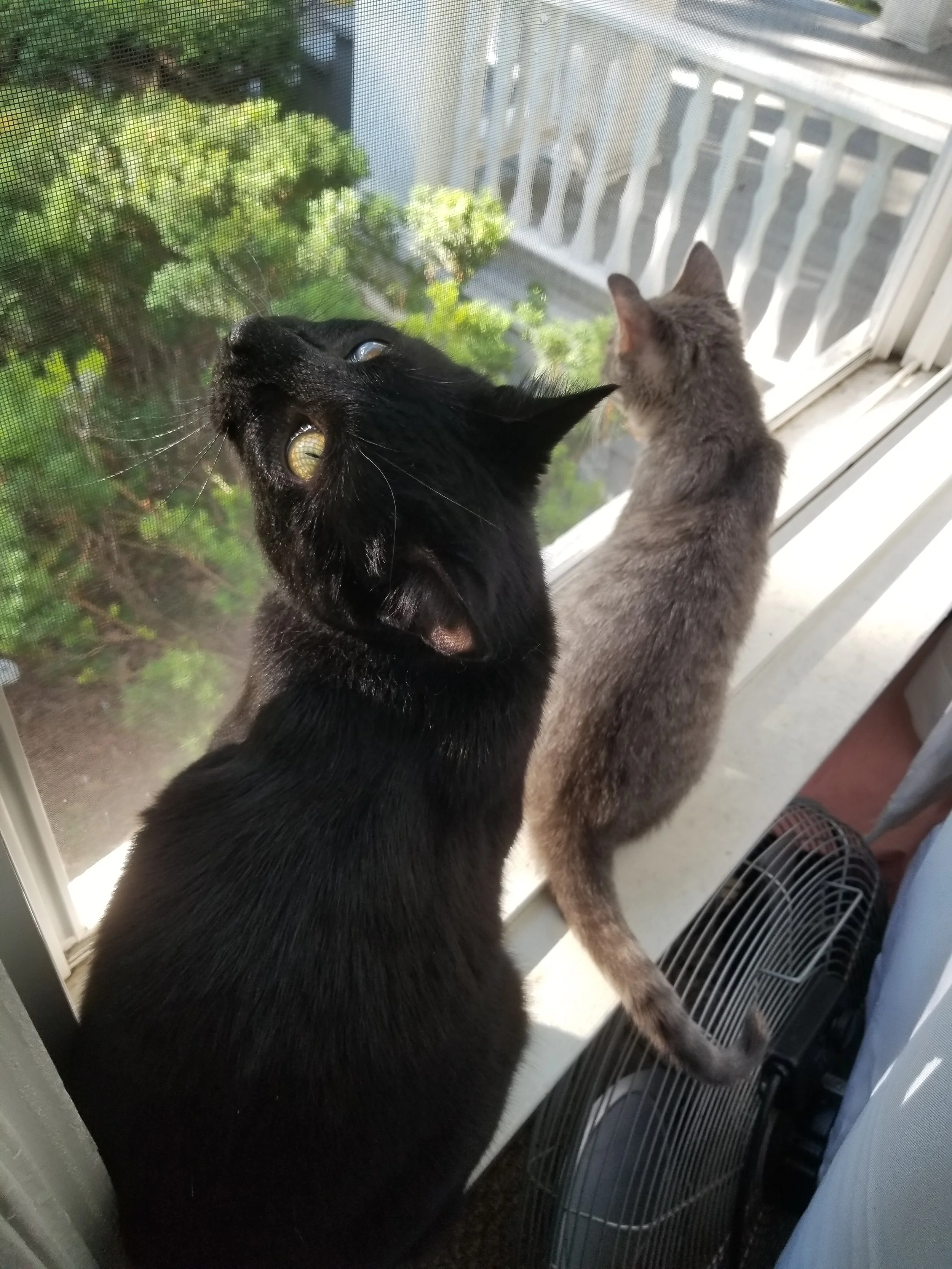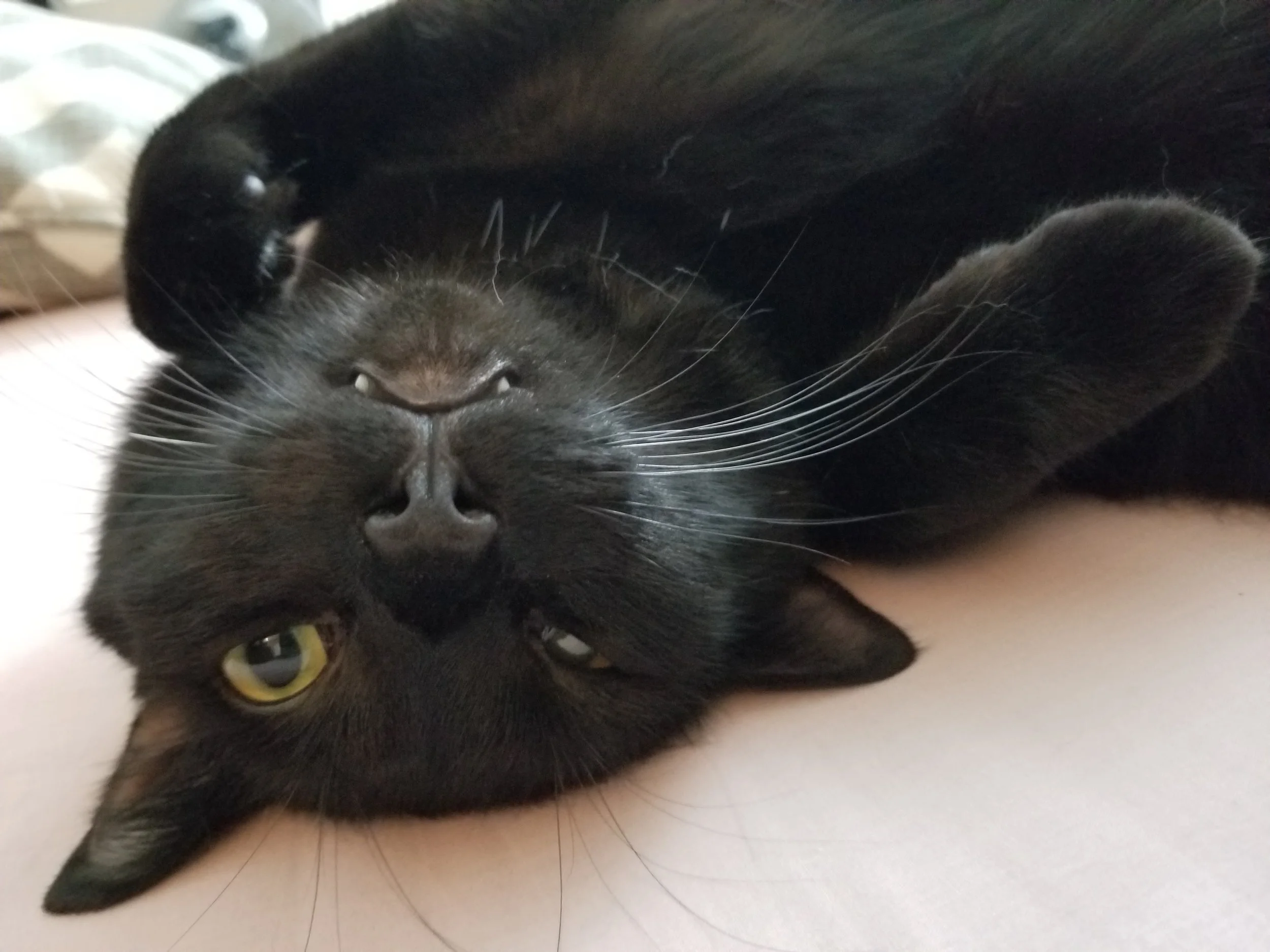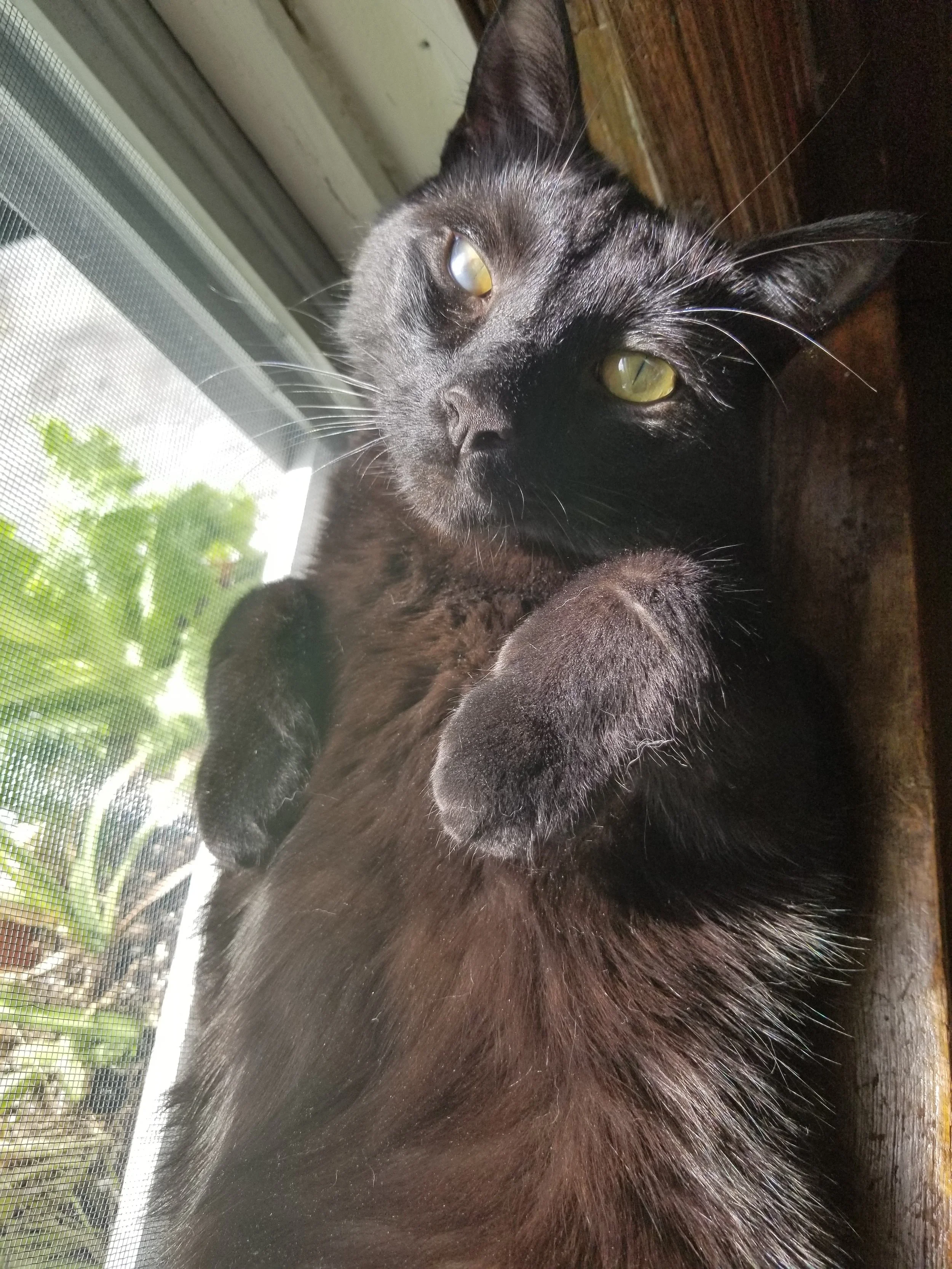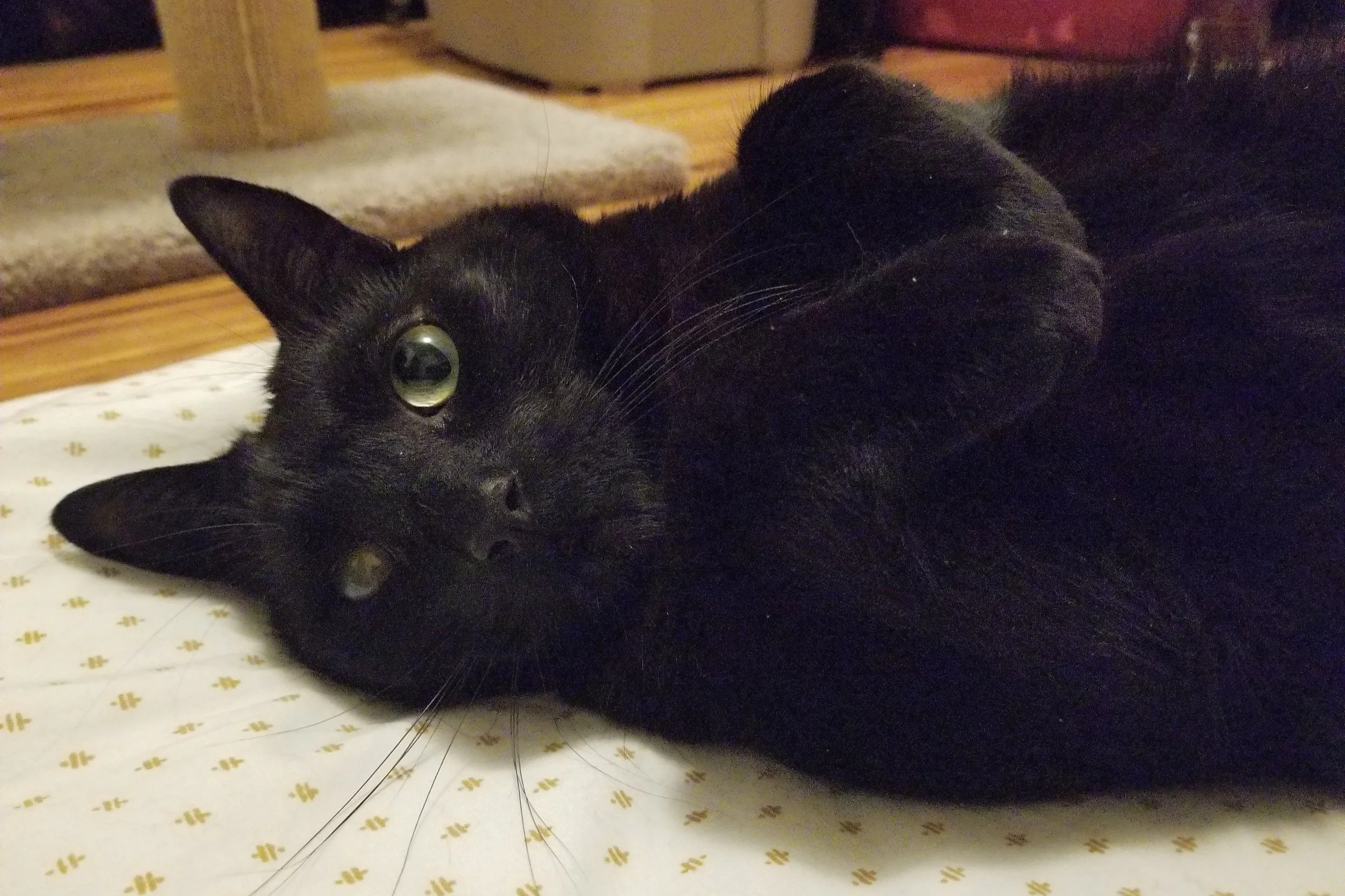Behavioral Euthanasia & Losing Jack
My first pet, straight out of college in a new city and in the first apartment my husband (then boyfriend) and I would share, was a tiny hellion of a black kitten named Jack.
Born in early May 2017, Jack was found in a barn, no mama in sight. Only two weeks old, he lay next to one sibling who was already deceased. He and his living sister were very sick and close to death themselves. They went into the care of Kitten Korner Rescue, a small foster-based, grassroots cat rescue near Rochester, New York.
While Jack had plenty of spark and took to a bottle like a champion, the early trauma was too much for his sister, and she passed away soon after rescue. He became a lone survivor.
When he was a few months old and weaned from the bottle, he got a new foster mom - a close friend of mine. When nobody came forward to adopt him, I convinced my partner that we absolutely needed to take him. He was cuddly and brave, and charmed us quickly.
That tiny kitten gave us a run for our money. We both grew up with cats, but this was different - Jack was incredibly energetic, curious, and insistent. His stubbornness and creativity for destruction knew no bounds. He got into absolutely everything, prompting us to never leave out food (bags of bread would be stolen from counters, carried across the house, torn into by tiny kitten teeth) or breakable objects (glass aaaaaalll over the floor), and I hardly got any sleep for MONTHS, as he’d be bored enough to keep more awake all night even after hours of entertainment and playtime during the day. At this time, I had NO behavior experience. I barely had cat experience. I was way in over my head.
Even so, we adored Jack. He loved being held and was adorably snuggly. He was whip-smart and trainable, learning to use a harness and leash, allowing us to trim his claws or apply flea and tick preventative without fuss. He learned verbal commands like “sit”, “touch”, and “drop it”. When he got a "little brother” in the nine-month-old kitten we adopted when Jack was a little over a year old, he took him under his wing and became his best friend.
When Jack reached nine months old, he started to hiss at visitors coming into our apartment.
When he was 18 months old, he guarded a spilled trash can and chased off our friend, his catsitter who he previously really liked.
By the time he was three years old, people coming into our apartment or even just standing on the other side of the door would be greeted by hissing and growling. If they entered, they’d be promptly met with claws and teeth. Over the next few years, it just got worse. He became a real danger to anybody but myself and my partner. It wasn’t like his aggression just occurred when people took the initiative to bother him. He’d seek them out, get in their face, stare them down nose-to-nose, then strike. He meant blood. Very occasionally he’d even turn his claws or teeth on me.
Jack is the reason I started studying behavior in the first place. I needed to understand how to help him. What had we done wrong? What was wrong in his brain? In what ways could I enrich his life to help, in what ways could I advocate for him at the vet’s office?
And let me tell you, we did EVERYTHING possible to enrich his life and “solve” this problem. Behavioral training, medications, enrichment, all the toys and puzzle feeders, consultations with more experienced behaviorists, several different vets and professionals, bloodwork… Jack was my family, my first baby. I was determined to do anything and everything possible to make him happy, healthy, and safe - including safe to be around people. At the same time, I knew things were getting worse. I knew cases like his generally didn’t result in a happy, healthy animal.
Jack had every hallmark of a cat slated to have issues - born to a likely sick barn cat mom who either abandoned him or died, he was very sick early on which is quite traumatic, no littermates to learn proper behavior from, a bottle baby who grew up as a single kitten and began to see humans as his equals instead of other cats… all of these things together will make someone versed in cat behavior send up red flags. I didn’t know this back when we got him.
Maybe I could have done some things differently - gotten him a cat sibling earlier. I try to not beat myself up about the “what ifs”. It may not have made a difference.
The last threshold we needed to cross was when we were buying a house in February 2023. Jack’s meds weren’t working as well as they used to. He was starting to suffer physical ailments because of his internal stress level (arthritis, urinary stones and infections resulting in surgery, a scary and painful seizure-like condition called hyperesthesia). We thought that more space, a fresh start in a new neutral territory to be reintroduced to other humans, and a yard to explore on his harness may be the answer.
At first, things seemed optimistic. He interacted with a couple family members with some positive behavior. He enjoyed the yard. For a couple months, we thought, “this is it, his turn to be a normal cat”.
Then as Jack was getting comfortable and the novelty of the house had started wearing off, he lunged at my sister, a person he generally tolerated, who was just sitting on the couch and being quiet. If I hadn’t seen it coming and blocked his leap with a blanket, I don’t know what his plan was. I was sure he would have hurt her. He was also starting to fixate on his brother Beans, stalking him around the house. He’d stalk ME around the house, especially at night, a blur of shadowy fur launching himself at my legs as I walk down the hallway to bed.
It was late April 2023 when the proverbial last straw happened. Jack was stalking Beans across the dining room table, biting him hard enough to pull fur, ignoring the signs that Bean was politely giving that he wanted no part of this. I was working on my laptop at the table, looked up, sighed at the now-familiar scene, and put my hand out to distract Jack and break up his concentration while I planned to grab him a toy - which is honestly not recommended, you never want to break up tense cats with your hands. But I wasn’t thinking, wasn’t reading the vibe properly. He usually listened to a quick visual redirection. This time, he redirected on my hand, grabbed it in his paws, and bit down on my arm. I reacted in a panic, pushing him off me, and he jumped down onto the ground, turned, hissed, and lunged at my leg. I grabbed a pillow from a few inches away and put it between us, expecting him to recover from his own surprise and walk away or simply sit and give me a disgruntled look. Instead, he hissed and lunged at my legs again. I yelled out for my husband, who was able to pick Jack up and place him in another room (Jack NEVER bit my husband, his absolute favorite person in the world). I burst into tears. I had never seen Jack quite like that, and it left me feeling deeply shaken.
That night he was back to himself, more or less. I could hold his paw as he slept peacefully on the couch next to me, his face cuddled against my leg. My heart felt shattered. Here was this cat who had such a personality, such a sweetness and cleverness to him, and I knew it was only a matter of time before he seriously hurt someone, not just a minor scrape or scratch. His low threshold for stress was making him dangerous, and making his body, still young at just under six years old, deeply and chronically ill.
I called our incredible vet at Connecticut Feline Medicine and Surgery. They were able to get us in for a euthanasia appointment that day. They had discussed Jack’s behavior and history with us in detail before. They knew this may be on the horizon, and accepted our choice with compassion and sensitivity. We gave him a day of rolling around in the sunshine and moss of our backyard before bringing him in.
I won’t go into the details of the day of the appointment. The vet handled everything with so much care. It was still the most haunting, miserable, horrific day of my life. I was a husk of a person for months. It devastates me and sends me into a panic to think about a year later. I know I’m lucky - the absolute worst day of life was the day my cat died. Could certainly be worse. But it wasn’t just “my cat died”. I had to make the active choice to let him go. I had to drive him there, sign the papers, pick out his urn, ask for a paw print. I felt like I failed this innocent creature who relied on me for survival, who I “should have” done better for. I felt like I killed him. Against all reason, I felt like there must have been something more I could have done, even though as his vet said, “He’s been suffering and been in a lot of pain for a long time.”
If you’re ever faced with behavioral euthanasia for an animal companion, know you’re not alone. It doesn’t get talked about enough. Many people have joined this awful club. There are discussion boards on Facebook and Reddit to seek support from people who have been in the same position. There are always outlets for healing, even though judgement from others (real or perceived) for making this choice can be very isolating.
Here is the awful truth: Some animals can’t be “fixed” no matter how much love or time or resources you have to give. Some are too sick, or too dangerous, or too miserable in their own bodies. It’s not their fault. It’s often not even our fault. Life, and nature, can be random and cruel.
I don’t regret adopting Jack, despite the heartache losing him has caused, or the things we gave up to make his short life safer and happier. I learned so much about myself, cats, and compassion by being his guardian for six years. I forever hold the memories of his teddy bear-soft fur, his sweet face when he was calm and cozy in a sunbeam, the way he’d melt into my neck and purr when I’d pick him up and hold him.

